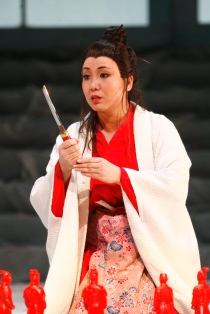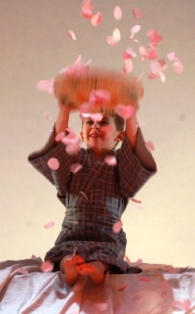
Shu-Ying Li: A Butterfly Who Has Everything
Soprano Shu-Ying Li knew she wanted to sing
as a child growing up in

One day she heard “O mio babbino caro” (“Gianni Schicchi”) and “Un bel di” (“Madame Butterfly”).
“What music! It was like goose bumps. It just melted me. I told my voice teacher, ‘I want to learn this kind of music.’
‘Oh, that’s western opera,' she said. 'Puccini wrote this a lot.’”
Li, for whom Cio-Cio San in “Butterfly” is now a signature role, will sing “Un bel di” in Cincinnati Opera’s “Madame Butterfly” at 7:30 p.m. June 11 and 13, 3 p.m. June 15 at Music Hall. (All Cincinnati Opera evening performances now begin at 7:30 p.m.)
To learn western opera in
Li studied opera, lieder, French and Italian
songs and classic bel canto. “Those kinds of worlds just came to me. I learned
aria by aria by aria. My voice teacher
was very open-minded. She said Renata
Scotto is the great Butterfly in the world." On a visit to
Li describes herself as "really crazy for drama. That made me really crazy for opera, otherwise I would be a concert singer."
Li packed up her arias in 1998 and took them
to
“It was Musetta (Verdi’s “La Traviata”). I was so pretty! It was a life experience -- my very first opera with gorgeous red hair and blue eye shadow. It’s so funny.”
From there, she went to the Mannes College
of Music in
Li sang her first Butterfly for Providence
Opera in 2001. Since then, she has sung
it more than 50 times, in Europe, Asia and the
The design, by Michael Yeargan, is minimalist, with sliding panels framing the set front and back and a single stair unit extending the width of the stage. It allows for “a lot of movement" and for the focus to be on the music and the drama, Li said.
True to the fervent Puccini, the Lamos
production, with atmospheric lighting by Cincinnati Opera's Thomas Hase, is
dramatic to the hilt. There is enhanced
interaction between Butterfly and Sorrow, her child with the American naval
officer Pinkerton, who has married, then callously abandoned her. Sorrow will be performed by six-year-old
Tyler Christopher Backer of
“The child has so many things to do
onstage,” said Li.
“There is so much
communication between the mother and the little one.” Sorrow is onstage (though blindfolded) during
Butterfly’s suicide. Instead of ritual
hara-kiri ("belly cutting" or disembowelment) she will slit her
throat “with a big knife” just as Pinkerton enters the room.

“It adds weight to the tragedy," said Li. "I think it’s a coming thing."
Butterfly is a long, taxing role that is also very complex, since the singer must go from a 15-year-old innocent -- so in love that she throws off religious and family tradition to marry Pinkerton -- to a crushed, disillusioned adult when he returns to Nagasaki after three years' absence with his “real” (American) wife.
“If you want to be the best Butterfly, you have to have everything," said Li. Voice, passion. You have to be able to cut through the big, lush orchestra. It could be very dangerous. Some sopranos, after doing Butterfly many times, disappeared.”
Li is “very careful,” she said and practices “positive energy.”
“I think about where I have a big moment, then I give it all. I don’t want myself to think about getting tired. I get tired after I die, when I lie on the floor! When the curtain is up, if the audience loved it, then I’m back to life again.”
The other aspect of Butterfly is her traditional Japanese image and demeanor. She is a geisha, a performer skilled in the art of movement and able to get around gracefully in a heavy kimono and obi (sash).
“Facially, you can visualize me easily (as Butterfly)," Li said. "She’s an Asian girl. After the (heavy, white) makeup, I become Japanese."
Her body movement, however, "has to be
different from Chinese. In life, a
Chinese girl is actually multi-style, or no style. They’re very Italian sometimes, especially in
my hometown in the north part of
Li sang Butterfly in
After the performances in
Li thinks Butterfly is a great role for her because Puccini gives her "the emotion and personality” of an Italian. “I have that kind of personality, then I just add the subtle acting things. I try to add more after each production. I watch lots of Japanese movies and look at all the geishas’ movements. I try to transform myself as much as the audience can believe me as a Japanese girl.”
Two years ago, Li moved back to
Li also wants to sing more in her native
country. “Since I became an opera
singer, I never really performed in
Vivacious and outgoing, with a hearty laugh, Li feels a calling to teach as well
. “I really admire my voice teacher (Xiaoyan Zhou). She’s 91 this year and still teaches. I used to wish that one day I could be a great voice teacher like her, to have lots of great singers be your students. The Shanghai Conservatory just opened the door for me and said we support your career. Maybe it’s time for me to gain some credit in the teaching field.”
Onstage Li remains very busy, with two more
Puccini operas coming up next season, “Tosca” and “Manon Lescaut.” “In the future I’d like to do a little more
Verdi, like ‘La Traviata’ and ‘Ballo in maschera.’” She will do her first “Don Carlo” (
“I like Verdi’s music. It’s healthy singing and very noble. It’s a different character.”